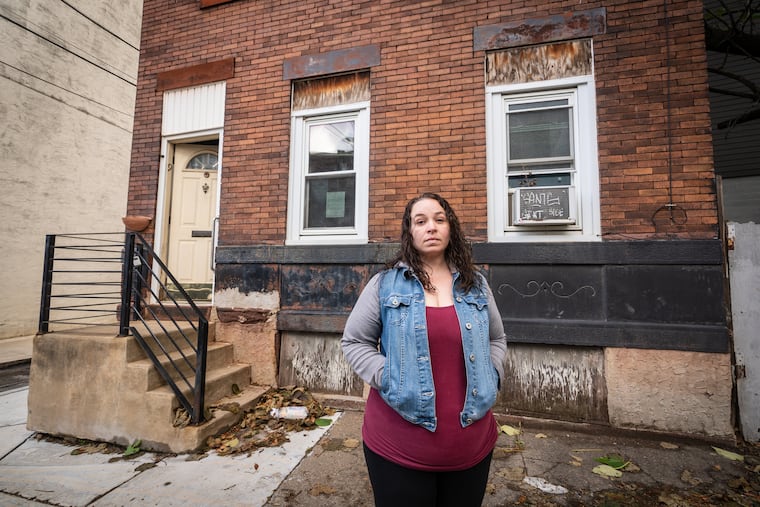Philadelphia’s blight-busting business is under scrutiny at City Council
Testimony echoed the findings of an Inquirer investigation that uncovered an ecosystem of nonprofits, run by real-estate investors, using the state conservatorship law for their own benefit.

The Malesiewskis had lived in their three-story Queen Village rowhouse since the 1930s. But by 2016, Edward Malesiewski had died, and his widow, Olga, was in a nursing home.
That left the property vacant and blighted — conditions that were the basis for a lawsuit, by the Philadelphia Community Development Coalition and an investor group, to take over the property under Pennsylvania’s controversial conservatorship law, Act 135. Under the law, the nonprofit and its partner were permitted to get control of the property, rehab it, and sell it for $990,000 — more than $900,000 of which went to the organizations’ costs and fees.
Now, four years later, the property is sitting vacant once again.
This time, it’s because the current owners of the home say it’s uninhabitable and filled with mold. According to a recent lawsuit, they lived there for just two weeks in 2023. Then, “they were displaced from the home as a result of the extensive and prevalent systemic water infiltration and damage,” the suit contends.
The case highlights one of the key criticisms of Act 135: that some conservators can run up the tab with costly construction and legal fees, amounting to equity stripping by predatory nonprofit organizations.
» READ MORE: Extreme Home Takeover: Busting blight is big business. Poor Philadelphians are paying the price.
One such critic is City Councilmember Jeffery Young, who convened a hearing on the law Thursday. City Council has no power to change the law, but can pass on recommendations to state lawmakers.
“We are all for removing blight from our city,” he said. “But there are some fundamental core and constitutional issues. … I believe that when we are taking possession of property, divesting folks of their property rights, there needs to be a little bit more scrutiny.”
At the hearing, property owners, particularly in gentrifying areas, said they were under siege.
Many of their stories echoed the findings of an Inquirer investigation that uncovered an ecosystem of single-purpose nonprofits, many of them run by real-estate investors, using Act 135 for their own benefit — by filing cases in order to obtain cash settlements, or buying properties targeted for conservatorship at a discount and then flipping them for large profits. In other cases, the law’s fee structure, which reimburses conservators all their costs plus up to 20% of the sale price, meant that property owners were left with nothing.
» READ MORE: Pennsylvania's blight-busting law has unintended consequences
Raymond Johnson, the owner of a small real-estate development company, said he had just secured a $440,000 construction loan to rehab a house on Christian Street’s historic Black Doctors Row when he was hit with an Act 135 petition — the second in four years. The lawsuits prevented him from accessing that capital, he said, and cost him $60,000 in legal fees. In the wake of that, he ended up losing the property at sheriff’s sale.
And Erdis Hennigan said that a developer who wanted to buy her family’s Lancaster Avenue property “dragged us through the legal system for five grueling years.” Eventually, she paid the developer $29,000 to settle the case.
But Paul Toner, a lawyer who has filed scores of Act 135 cases, said critics “misunderstood” the law, because it can’t be used against residents living in their homes. And, he said, it is a necessary protection for neighbors. “They’re suffering significant economic loss. They’re suffering [threats] to the safety of their family.”
» READ MORE: How an obscure City Council rule leaves a trail of blight in Philadelphia
City Councilmember Jamie Gauthier, whose district encompasses much of West Philadelphia, said she’s had to step in to stop “petitions filed against people who are actually living in their properties … which is traumatic and harassing.”
Gauthier acknowledged that the law, at times, was crucial to helping neighbors shut down nuisance properties, such as a house on Walton Street that attracted squatters, drug dealing and violent crime.
“I did everything I could for almost a year to bring the police and [the Department of Licenses & Inspections] to the table to shut this property down, and bring it back into productive use for the neighbors. We couldn’t do it,” she said. So, neighbors worked with Act 135 nonprofit Scioli Turco to take control. “That was an example where Act 135 was the only tool available to make that block safe again.”
» READ MORE: A Fishtown nonprofit went to court to seize a family's home
Gauthier said that, more often, she saw predatory conduct.
A University of Pennsylvania report, released last year, found that cases are disproportionately filed against Black and Asian American property owners, and in areas where rising property values have already led to an elevated risk of residents being displaced.
The report also raised concerns that many owners facing Act 135 cases are poor, elderly and ill-equipped to defend themselves. Others facing petitions are in nursing homes, such as Malesiewski, or lifelong Fishtown resident Denise Pomroy, who died in December as her family was scrambling to defend against an Act 135 petition. The family’s story, which gained attention on social media and in The Inquirer, sparked Young to call for the hearings.
“This being used to steal wealth from Black and brown people,” said Gauthier, “is absolutely what we have to stop.”